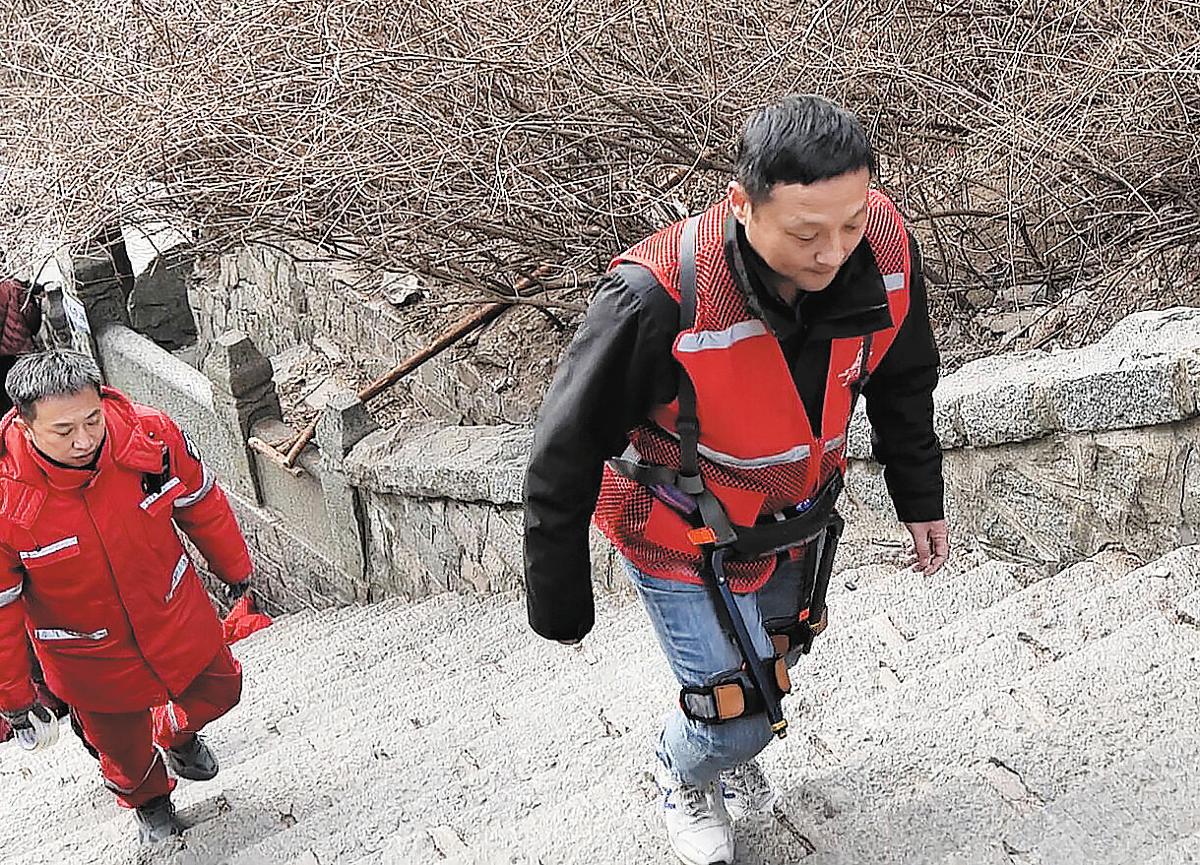
A worker tests a robotic exoskeleton while climbing the Taishan Mountain in Tai'an, Shandong province, during Spring Festival this year. PROVIDED TO CHINA DAILY
For 23-year-old Zhao Xiangcai, a college student in Tai'an, Shandong province, climbing Taishan Mountain — a popular scenic spot known for its steep terrain with over 7,000 steps — had always been a daunting task. This Spring Festival, his otherwise exhausting experience was transformed by a robotic exoskeleton device.
"It felt like the robot was doing most of the work for me, and climbing was so much easier," Zhao recalled. "I simply pressed a few buttons under the guidance of the staff, and it (the device) automatically adjusted to my walking pace. It was so easy and cool."
The robotic exoskeleton, weighing just 1.8 kilograms, has been developed by the Taishan Cultural Tourism Group in collaboration with Kenqing Technology, a company based in Shenzhen, Guangdong province. It is designed to assist users in climbing steep terrain with ease.
The device, which fits snugly around a user's waist and legs, integrates advanced ergonomics, power electronics and artificial intelligence algorithms to perceive movement and provide assistance based on the terrain and the user's strides.
The robotic exoskeleton can function nonstop for more than five hours on a single charge, covering approximately 14 kilometers of steep terrain, making it an ideal companion for those who want to enjoy the bliss of mountains without excessive physical strain.
Ten of these high-tech devices debuted for a trial during Spring Festival and quickly became popular among tourists of all age groups, including elderly visitors, young adventurers and those with lower physical endurance levels.
Wang Houzhe, deputy Party secretary of Taishan Cultural Tourism Group, said that more than 400,000 tourists visited the mountain during the holiday, and the robotic exoskeleton received an enthusiastic response.
"The feedback has exceeded our expectations. Visitors were curious and excited about the technology. Many even called to inquire about purchasing the device for elderly family members or those with hindered mobility," he said.
Encouraged by the success of the test run, Wang said the company plans to roll out 200 devices for sale by March and scale up production to 3,000 units by June. Until then, visitors can rent these devices for 60 yuan ($8.27) to 80 yuan ($11.03), depending on distance and time.
Service points along the climbing route will provide battery replacements, maintenance and consultation. The devices, equipped with GPS, are monitored closely by a management team.
Beyond mountain climbing, the robotic exoskeleton can have broader applications, including for fitness routines, walking, running and navigating stairs at home or work, Wang said, adding that the estimated cost is less than 10,000 yuan apiece.
Zhao, the college student, said, "I'd like to buy one for my grandparents, if the price is reasonable."
Taishan Mountain's tourism sector has been integrating AI technology for some time now. It previously introduced robotic dogs and developed GPS-equipped smart audio guides.
According to a report by the China Academy of Information and Communications Technology, humanoid robots are poised to become the next major technology platform after personal computers, smartphones and new energy vehicles, potentially forming a trillion-yuan-level market. It said humanoids will help address labor shortages and challenges posed by aging populations, particularly in manufacturing and agriculture.